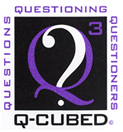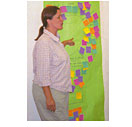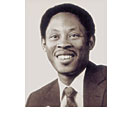Donna Sider: "I'm questioning more."
When Donna Sider finished her tenure at the 2000 Summer Institute for Medical Ignorance (SIMI), she expected to instill a change in her students. What she hadn't anticipated, however, was that she, too, would change. "I'm questioning more," Sider says, pausing to direct a group of excitable sixth-graders at Baboquivari Intermediate School in Sells, Ariz. "I've been using the question mark throughout, since I got back from the program." Sider's students can attest to that. In the back of her classroom, a four-foot green question mark is a touchstone for different lessons. She says it's just one thing that arose from her SIMI experience, where she worked on infectious disease research. Sider, who teaches reading and science, says she pushes students to question what they're reading and what they've been taught. "I like the question mark and how it's set down," she says. "Questioning focuses it better for them. I would never have thought to do that." Sider grades her students' questions based on effort and participation, which she says encourages them to keep asking. Her students' parents and the school administration see her as a model for the question-based learning they're trying to implement. "We're trying to get inquiry into the program," she explains. "They (students) are not in the habit of doing that."
Art Kindler: "There's learning taking place."
Years ago, during a stint in the Army, Art Kindler almost became a doctor. Instead, he chose teaching - and he says the SIMI helped him realize that he made the right choice. Kindler, a third-grade teacher at Van Buskirk Elementary in Tucson, Ariz., says his attraction to teaching was natural, although he loved medicine."I always wondered what it would have been like," he says, adding that he was not disappointed in his choice. But his summer research in the cardiology lab did more than simply illuminate the world of medical research. Kindler credits the program with helping him connect with his students. "When you're in a field that's new to you, you're using new terminology. That reinforced the fact that I need to have patience," he says. "It's a humbling experience to be a student again." Since his graduation from the SIMI in 2000, Kindler says he's been slowly working the concept of inquiry into his lessons, though he's grappling with how to handle large numbers of questions. Currently, his class is monitoring the arrival times of trains that pass by the school several times a day. Kindler says he will use that data to help the students think of questions about statistics and the rail industry. "It (questioning) helps them begin to reason. It spurs thinking," he says. "When one can understand enough to ask questions, there's learning taking place."
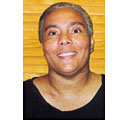 Pamela Williams: "They're thinking more."
Pamela Williams: "They're thinking more."
Just four months out of the summer program, 2001 SIMI graduate Pamela Williams says she can't wait to develop her students' questioning skills. A fourth-grade teacher at Sewell Elementary in Tucson, Ariz., Williams says her motivation for entering the program was personal as well as professional. "I love science -- anything scientific," she says. "I really liked the program." Even so, Williams admits that confronting her own fears about questioning proved to be difficult at first. "I was intimidated by my own ignorance," she explains. "(Now) I have questions each day -- I've never done that before." In her classroom, Williams says she strives to ensure that her students feel comfortable with ignorance. Each night as homework, they are required to develop one question -- an assignment that will increase to four questions by next year. "It's definitely changed how I teach. It forces me to be accepting of all of their questions," says Williams, who spent her time at the SIMI working with Jack Copeland, MD at the Artificial Heart Program. "It's really causing deep critical thinking." In all, Williams says she's been pleased with her students' cooperation, and she is planning a full ignorance lesson for early next year. Most of all, she's thankful that her students have been exposed to this type of learning. "They're vocalizing more and they're thinking more," Williams says proudly. "They're not little robots putting out answers."
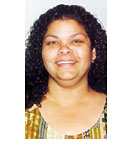 Wilma Amaro: "Questioning is a part of ownership."
Wilma Amaro: "Questioning is a part of ownership."
Wilma Amaro liked the summer program so much that she completed it twice. In 1991, Amaro was among the first educators to participate in the teaching portion of the Summer Institute on Medical Ignorance. In 2001, the Pueblo High School teacher decided she needed a refresher course, and spent the summer working with Cynthia Adamson, PhD, at the Sarver Heart Center. "It was time again to remind myself what science is like in the real world," explains Amaro, who says she almost pursued a graduate degree in science before becoming a teacher. "It's important to give (myself) a reminder." Since finishing the program in 1991, Amaro has helped SIMI staff members develop an Introduction to Molecular Medicine course for students. Additionally, she has implemented ignorance into several lessons at Pueblo in Tucson, Ariz.; her students' research projects, for instance, are based on their own questions. She says this is especially important for the disadvantaged and bilingual teens who are among her pupils. "Very few students respond from regular lectures," Amaro says. "You have to be a very creative teacher to get through to these kids." Amaro recently learned that a significant number of her past students have gone on to have successful science careers -- a fact she attributes in part to the ignorance-based learning she's implemented.
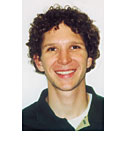 Matt Haverty: "I value questions more."
Matt Haverty: "I value questions more."
Long before he joined the Summer Institute on Medical Ignorance, Matt Haverty made it clear that his classroom is question-friendly. On the wall above the chalkboard, a mandate to "always question" joins rules like showing up on time and being respectful to classmates. This rule, he says, has new meaning since he finished the program in summer 2001. "I would say I value questions more," says Haverty, who teaches freshman biology at Amphitheater High School in Tucson, Ariz., and spent his summer doing research in the department of surgery's clinical research unit. "I've always kind of valued questions, but it's a lot more now." Earlier this year, Haverty's students participated in a "pondering round" -- a session of question-writing where students were encouraged to write down their biggest wonders about Question Mark everything from social life to school. Now, his classes are readying for an inquiry-based lesson Haverty designed this summer about water concentration in the body. For the most part, Haverty says his students have responded well to ignorance techniques, although they're more likely to write their questions down than ask them aloud. Even so, he says the students are getting used to, and even enjoying, their ignorance. "Mostly it's just preparing the students for what they'll be doing," Haverty says. "That tends to open their minds."

